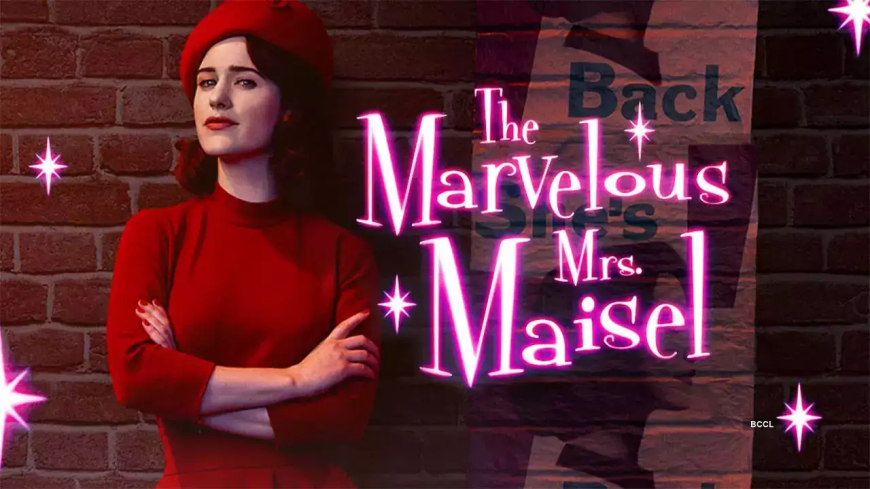The Marvelous

The 1960s. The revolution era. The Beatles happened. And so did the story of The Marvelous Mrs. Maisel. As the film critic Sucharita Tyagi says, 'women telling women stories'. And more than that. Not just a woman's story but everything and everyone around her. All the world revolves around herself, and between that, her search for herself. And no, she never asked for it. It just came. She came with a tragedy that changed her life forever. For worse or better? Are we not so eager to explain everything happening around us until our last breaths, too? And…all of this is in the genre of comedy. I honestly consider this to be a very fragile genre. It is a challenge to be taken seriously enough. About the audience peeping into something more than the hysterics. Of not appearing careless. And finally, the most crucial part of all, the humour being humorous enough. What to say about the marvelous Amy Sherman Palladino, the creator of this masterpiece who has brought about the exact flavour this genre needs. After Gilmore Girls, she delivers yet another out-of-the-world yet relatable to every soul on the earth, full of mischief, dance, music, fun, and humour. The story of the Marvelous Mrs Maisel. Compiling five seasons together, this web series is the story of Miriam Maisel (aka Midge) (Rachel Brosnahan), who lives in New York City. Coming from a Jewish family, she lives with her husband, Joel and her two kids, Ethan and Ester, in an apartment, and her parents, Abe and Rose, live in an apartment just below them. Her life story begins smooth as butter, happily being a devoted housewife and mother of her two children. It all begins before Yom Kippur (A Jewish Festival). She welcomes us into her world and prepares us speedily for the festival. She is all about the streets getting the best lamb from the butcher and yelling to everyone that they bagged a Rabbi for the upcoming celebration. She visits her husband in his office, who aspires to be a stand-up comedian. Midge makes her special brisket to bribe a workwoman, Susie, for a bar set for Joel's stand-up at gaslight. Susie heartily dislikes Joel, and Midge can't figure out why. They go there, things happen, things happen again, and boom, Joel decides to leave her. Out of the blue. Nowadays, it is very common to get under a woman's skin in the 1960s and picture it. Yes, boom! Mirriam, a picture of shock, goes to her parents downstairs for help. And the very first response they give is, 'Why, what did you do?' And that is the point where she realizes that she is alone henceforth. For every battle, for every joy. She gets onto a train with a wine bottle in her hand, reaches the gaslight straight on the stage, and takes it all out. When her own family won't listen, she decides to tell strangers. And damn, it turns out to be the most natural and raw and hilarious performance out there, and we see the same Susie smiling in the corner of the bar, looking at her performance and offering to be her manager and make Midge the best comic out there. Since that moment, Midge has been like a set-up comedian for life. Dealing with all kinds of politics, the workings of show business, the way everyone sizes up a pretty looking lady to be only an actress or a singer but not a comic, because that's not what ladies do, hiding from her parents, now getting into a thing what her ex-husband is a failure at, she and Susie make their way through the world. Midge is seen proving that she is beyond what she looks and dresses up. And for that, she doesn't find the need to stop dressing up, like her father Abe, a researcher at Columbia University, says, that 'the uglier you are, the more brilliance is within you.' But Mirriam's intelligence shines out. She goes out there, talks without trying, and performs with ease and confidence. So easy to be the best, eh? The most interesting thing about Midge's character is that the changes within her and around her don't change who she really is, otherwise excluding her existence as a comedian. She is still an outfit-mad person; she measures herself daily to check if her figure is intact. She never was dumb; she didn't know where to project that intelligence and
sense of fun. She didn't know that she could. Her father, Abe, is a man of fixed ideas, and it seems as if he has never focused himself on Miriam, noticing that she is more interested in the frills and fancies, and all the smartness he ever cares about is academic. Hence, his hopes are busy fixated on his son, Midge's brother, Noah, who is a doctor. Meanwhile, Mirriam's mother, Rose, like every other woman in the era, has a blindfold of fixated ideas for women to make their way through the world. Devote to your husband and kids, manage the house, sleep with your skin and hair care routine, and repeat. And Joel's parents are the comic dumb-ass but innocent got at-heart kind of characters the whole time. They contribute fun time to the creation. The most exciting character arc throughout is that of Joel, though. It's often said that some relationships become better when out of marriage. When Joel comes back to his senses but then learns that it's too late, his typical response is expected to be villainous. But he surprises us to no end. Instead of pushing Mirriam to return to him, he makes up for his mistake by being her best friend and a better father and respects her for carrying everything alone. Though after-divorce friendships are often seen in many movies and web series, it feels like it is forced or a rule to be followed, and it is more for kids' sake. Here, it is just about them. Though the entire thing has high values of women empowerment, it is not preachy, exaggerated or comparative. Its beauty truly lies in its deeply under-layered subtility. Leaving everything aside, the real question is, why is it so relatable? While we were watching the 1960s in 2023, the show's relatability lies in the similarity of pain, struggle, relationships, happiness, success, friendship ...everything beyond language, dress and era. The entire show is written so beautifully; more than that, it's written smartly. It is hitting to the point, crisp, funny, and right on emotion. Let's say that this series is an all-rounder. I'm in awe of its cinematography. After watching several videos about how cinematography and lighting were done, hats off. The costumes…especially Misdge's…. would kill to have them. After watching videos about its editing, the crisp cutting gives it flow, especially the brilliant use of match cutting in a sequence to jump back and forth in time. All the actors have gone out of their way to perform their part, most of all Rachel Brosnahan. Watching her dive into Midge, from her walk to her acts on stage, is a pleasure. To summarize, the entire five seasons feel humorous and serious as seasons pass. Moreover, in the final season, a question arises: What was the hurry to suddenly wrap everything up? It's like the first two seasons are slow in time; it might not even be 2 or 3 years, and then suddenly, in season 5, her entire life is summed up. It is questionable, and it feels quite hurried off unnecessarily. Also, some people in Midge's life do not get a proper exit, and their role in her life is not properly thanked enough. Her best friend Imogene, for instance. She suddenly disappears from the entire scene. It's not even like they broke up, nor is it that Midge has changed so drastically that she would not find anything to discuss with her. But above all this, even with all the sugar praises dripping around, the show gives a lot back. The final scene wins the heart. With all the troubles and struggles, money or no money, failure and success, beyond all of it, love, friendship, relationship and motherhood matter. Because that is what has shaped you, built your life, made you who you are…and these things have made her who she is. Marvelous….Mrs. Maisel.












































